

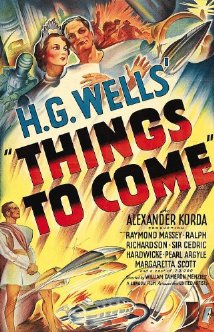 In 1935, when H. G. Wells scripted this 1936 film, based on two works of his, The Shape of Things to Come and The Work, Wealth and Happiness of Mankind, he felt - talk about premonition! - that the world was just about to enter another world conflict. (1939 and the bombing of London proved him right).
In 1935, when H. G. Wells scripted this 1936 film, based on two works of his, The Shape of Things to Come and The Work, Wealth and Happiness of Mankind, he felt - talk about premonition! - that the world was just about to enter another world conflict. (1939 and the bombing of London proved him right).
Wells has that global war start in 1940 and his story, taking place in Everytown, Great-Britain, covers nearly a century, all the way to 2040.
A couple of decades into the conflict, the town is in ruins and society has broken down, with people living in separate (and primitive) communities.
In 1966, per Wells, a plague wipes out most of the population, leaving but a few survivors.
One day a spaceship lands nearby, its pilot tells the survivors of an organization which is "rebuilding civilization" thanks to new methods and new technology.
And it works! Reconstruction takes place, once again society is strong, people now live in underground cities - peace and universal harmony.
In the year 2035, however, as Man prepares for his first flight to the moon, a popular uprising against "progress" is brewing...
In a strange, pre-Star Trek-ish way, this film, helmed by William Cameron Menzies, is intriguing insofar as it is indicative of H.G. Wells's cautious optimism and in sync with the idea one (he?) had of our future in the first third of the 21th Century.
The other films shown in this sidebar pick it up from there!
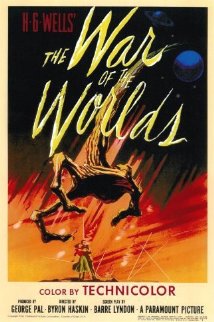
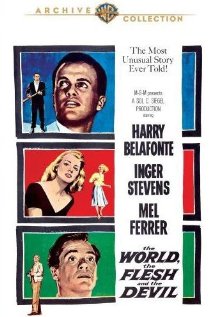
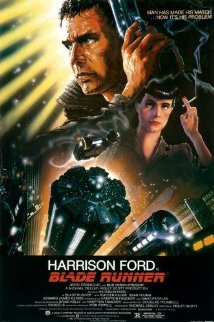
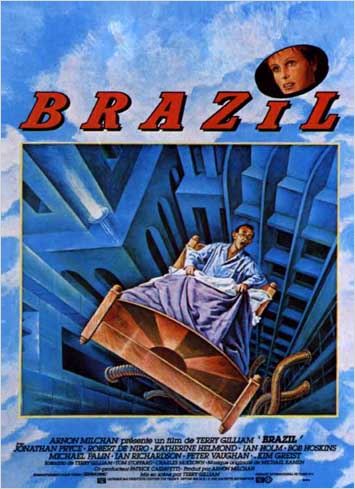
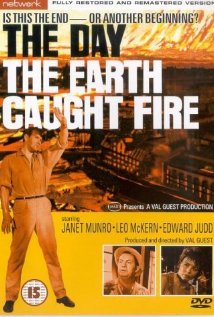
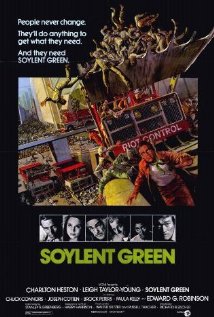
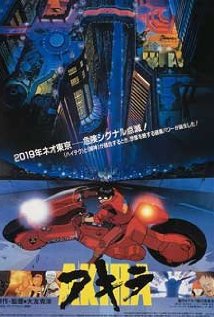
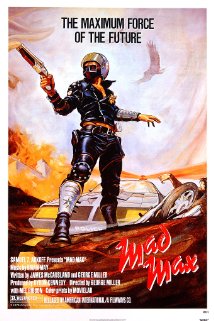
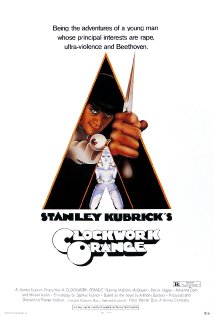
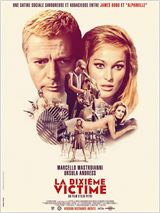
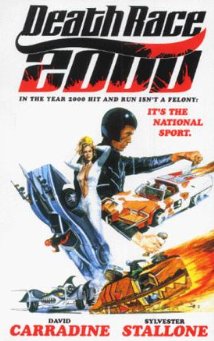
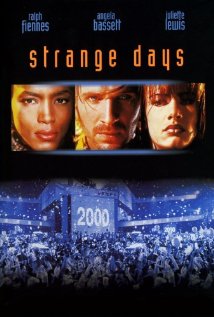
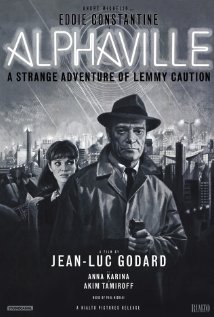
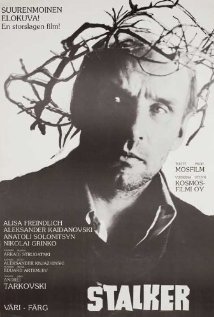
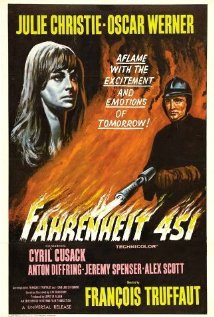
Destruction (The War of the Worlds) : Martians land in tranquil Anytown, USA, and proceed to destroy it entirely. (Based on H.G. Wells's most famous novel, this 1953 film is deeply rooted in the Cold War era - just replace "Martians" with Russians")
Annihilation (The World, the Flesh, and the Devil) : Trapped for a few days underground, a black miner finally resurfaces and finds himself alone in a deserted New York, as an atomic bomb has just destroyed humanity. Except for two other survivors: a blonde woman and a white man. Read: racial tension. (Produced by and starring Harry Belafonte, a champion of tolerance if there ever was one.)
The Dark Side of Light (Blade Runner) : In the Los Angeles of 2019, it rains all the time, cars woosh in mid-air, the skyline is cluttered with gigantic pulsating neon billboards and you never know if the person you just crossed paths with - or talk to - is a human being or a "replicant".
An Architectural (And Societal) Nightmare (Brazil) : In one word: Orwellian. directed by Terry Gilliam. Need we say more?
Hunger (The Day the Earth Caught Fire) : In London, the Thames has dried up, people line up at fountains for water, fires can erupt anytime, in any park. A massive drought resulting when two nuclear experiments conducted at the same time by the USA and the USSR shift the Earth's axis, bringing it closer to the Sun.
Hunger, for most, food for some (Soylent Green) : In a world that is overpopulated and ravaged by the greenhouse effect - the year is 2022 - society is divided in rigid castes: the masters, those who serve them, and the rest, the global "poor", the homeless unwashed that eat whatever plankton-based biscuits are provided by the state. Correction: by the Soylent Industries. (Does anyone say "modern economy"?)
Violence (Akira) : After World War Three (2019), the metropolis Neo-Tokyo experiences violent clashes between motorcycle gangs, and between police and civilians.
More violence (Mad Max) : Apocalypse soon in the wastelands of Australia. The social decay is total, gangs constantly defy the system - until they are confronted by Max (a leather-clad Mel Gibson), a former cop (and husband and father) about to slip into absolute madness.
Urban violence and sex reign supreme (A Clockwork Orange) : A romp à trois on Purcell's music or William Tell overture, a rape set to Singing in the Rain, a beggar kicked to death under a bridge by a gang led by Alex (a devilish Malcolm McDowell). Anthony Burgess's (and Stanley Kubrick's) vision of the 21st Century.
Violence as a game (La Decima Vittima / The Tenth Victim) : "The near future". In the Great Hunt, invented to channel people's violence, thereby eliminating war, a Victim and a Hunter, tailed by cameras, track each other down with one goal in mind: to kill each other.
Violence as a sport (Death Race 2000) : In the year 2000, and for the same reason, the government of the United Provinces of America organizes the Transcontinental Road Race, in which contestants run down and kill pedestrians to gain points.
Violence as a drug (Strange Days) : Meet the Squid, a device you hook up to your brain to "live" other people's experiences - the more violent the better. Los Angeles in 1999 as seen by Kathryn Bigelow (and James Cameron)
Meanwhile at the ranch (Dr. Strangelove) : ...read the Pentagon, the White House or whichever War Room the politico-military elite meet to discuss saving humanity but end up posturing and role-playing - and who gives a f-- about humanity? Grotesque, and irresistible.
Dehumanization (Alphaville) : Private eye Lemmy Caution is sent to a futuristic city in another galaxy run by a computer that has outlawed all emotion. Directed by no less than Jean-Luc Godard.
A New Order (Stalker) : A "stalker" (illegal guide) leads a writer and a scientist into the Zone, - an area (created by a meteorite, perhaps ?) now cordoned off with barbed wire and guarded by soldiers, in search of The Room, where their wishes may come true - or so it seems. Andrei (Solaris) Tarkovsky's take on our future world (1980)
Resistance (Farenheit 451): In the near future. TV screens are everywhere, books are outlawed and burned, and their owners persecuted. But a group of exiles is gathering in the forest nearby, each one of whom has memorized a literary masterpiece. Based on Ray Bradbury's novel, directed by François Truffaut (1966)
Suggestions? Comments? Fill out our Feedback Form.